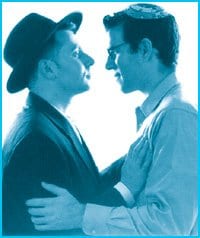It’s no surprise that many lesbians and gays have familiarity with the Thou Shalt Nots of ages-old organized religions. Arguably, since Leviticus 20:13 was first scratched on papyrus-and pronounced same-sex intercourse an abomination-queers living within Judeo-Christian culture have been especially alert to the personal impact of religious proscriptions.
And while we live in a secular age, there’s no denying that religions still have great global sway. They’re the glue of communities and nations; they provide spiritual nourishment and leadership. Often, that is, but not always and not for everyone.
Anyone remotely familiar with ever-popular televangelism knows that Leviticus is being quoted more than 2000 years after the fact. And for those who managed to watch two exceptional and grim documentaries at last year’s Out on Screen film festival-Parvez Sharma and Imtiaz Popat’s In the Name of Allah and Lionel Bernard’s Homophobia, That Painful Problem-it’s abundantly clear that religions and their adherents remain largely intolerant of the queer segment of the flock.
The relationship between homosexuality and Judaism, another of the world’s great religions, is closely examined in a film opening in Vancouver on January 31.
Speaking from New York City, its director, Sandi Simcha DuBowski, says that his documentary Trembling Before G-d began as a video diary, “an exploration of whether there is homosexuality within the Orthodox world.” He’d grown up a Conservative Jew and had never known anyone Orthodox and gay. His exploration subsequently “became something much larger, more global and complex than I ever imagined.” He spent six years and thousands of work hours pursuing that goal.
In addition to achieving personal insight, he managed to create a work that has taken him across the planet acting as a catalyst and agent for much-needed social change. The recipient of Best Documentary awards at Berlin, Chicago, Los Angeles and Seattle, it’s a vital viewing experience for the atheist and God-fearing alike.
Set within the closed-off communities of Hasidic and Orthodox Judaism, Trembling Before G-d is a remarkable document, easily capable of informing, angering, inspiring and saddening viewers. It depicts a religious way of life that accepts wholesale the scriptural condemnation of homosexuality (as major transgression, as abomination, as punishable by death). In the words of the learned scholar, Rabbi Meir Fund: “It’s an evil inclination. Work like mad to overcome it.”
With a documentarian’s flair, DuBowski drops his viewers into the hostile social setting. He shows us Orthodox protestors with placards proclaiming, “Homosexuality is a Revolt Against the Creator.” He introduces religious teachers and psychiatrists who confidently prescribe ‘cures’ of self-denial, medication, special diets, prayer, fasting, and “aversive conditioning.” And he gives us a taste of the punishment for not accepting doctrine: being shunned by your family, becoming a community pariah and, ultimately losing the chance to have a happy afterlife.
More than anything else, though, Trembling Before G-d spends quality time with tormented, profoundly torn individuals who cannot reconcile their religious and sexual identities. (It’s a telling fact that many of the women and men DuBowski interviews keep their faces hidden.)
These people want the secure community their beliefs offer them, and yet know they will be denied it if they seek out the love and sex they need. They strive but do not often succeed. One woman asks, “How can I be a religious lesbian? I can’t not be queer, I can’t not be religious,” and finds no way to bring the two fundamentally disparate parts of herself together.
Despite the anguish, there is hope. In his travels between Israel and the US, DuBowski found scattered signs of grassroots revolution, new rituals being formed on the bedrock of tradition. He’ll be in town as part of panel discussion held after the first two days of screenings (see below). Perhaps he can give an update on the changes he’s witnessed.
PANEL DISCUSSIONS.
Queer Panel Discussion
Feb 1
Following 4 pm screening
Interfaith Panel Discussion
Feb 1
Following 7 pm screening
Youth/Student Panel Discussion
Feb 2
Following 4 pm screening
Panel With Local Rabbis
Feb 2
Following 7 pm screening

 Why you can trust Xtra
Why you can trust Xtra


